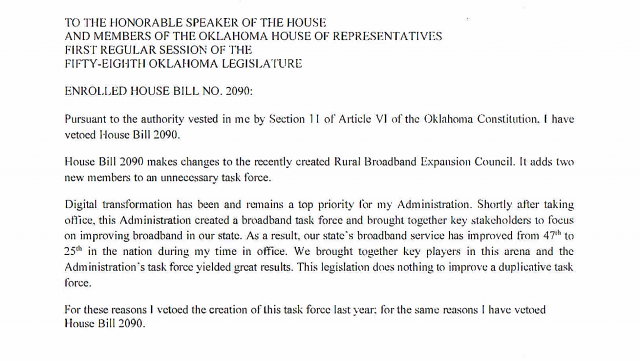

Oklahoma Gov. Kevin Stitt vetoed his third and fourth bills of the 2021 legislative session this afternoon, announcing his nullification of measures expanding the membership of a broadband council and exempting the Legislature and the judiciary from certain fees charged by other state agencies.
Stitt clashed with House leadership last year regarding digital transformation efforts and a Rural Broadband Expansion Council pushed for by House Speaker Charles McCall (R-Atoka).
Friday, Stitt vetoed HB 2090 by McCall and Sen. James Leewright (R-Bristow) to add a pair of new members to the 14-member council, which was passed into law last year after the Legislature overrode Stitt’s first veto on the topic. The bill added members representing a wireless internet service provider and a Native American tribe, and it also added six new definitions to the statute, including what constitutes “broadband.”
In his veto message this year, Stitt again called the council duplicative and labeled it “an unnecessary task force.” His full message reads:
House Bill 2090 makes changes to the recently created Rural Broadband Expansion Council. It adds two new members to an unnecessary task force.
Digital transformation has been and remains a top priority for my administration. Shortly after taking office. this administration created a broadband task force and brought together key stakeholders to focus on improving broadband in our state. As a result, our state’s broadband service has improved from 47th to 25th in the nation during my time in office. We brought together key players in this arena and the
administration’s task force yielded great results. This legislation does nothing to improve a duplicative task force.
Rep. Logan Phillips (R-Mounds) has been heavily involved in the Rural Broadband Expansion Council, and he defended the body’s work.
“I have seen the governor’s veto — as have my peers in the House and Senate — and we know over the last year the Rural Broadband Expansion Council has made gigantic strides to bring high-speed internet to Oklahomans,” Phillips said in a statement. “We will take [the governor’s] opinion into consideration and will deal with it next week, but I am going to enjoy the weekend after a solid deadline week of doing the people’s work.”
Stitt vetoed a second bill by McCall on Friday: HB 2088, which was also authored by Senate Appropriations and Budget Chairman Roger Thompson (R-Okemah). Except as otherwise provided by law, the measure would have exempted the Legislature and the state’s court system from “any and all fees and costs for services rendered by any appropriated state agencies.”
Stitt’s full veto message on HB 2088 said:
Accountability and transparency remain top priorities for me and my Administration. It is crucial that all of state government remains responsible to the Oklahoma taxpayer. State agencies, as well as the Legislature and Judiciary, have a duty to manage those dollars in a responsible and efficient manner. This is why our state entities are billed for services they consume and provide.
House Bill 2088 would exempt the Legislature and Judiciary from fees and costs of services rendered by appropriated state agencies. While I recognize these branches provide vital functions to the state. this exemption shifts responsibility from one state entity to another, while all other state entities are required to manage their own costs of services directly. (…) House Bill 2088 contains no language guaranteeing additional appropriation to cover the cost of services to be provided to the Legislature and Judiciary.potentially resulting in a costly negative fiscal impact in the future. This unnecessary shift in responsibility does not comply with this Administration’s standards of accountability and transparency.
Stitt vetoes bills on abstractors, vision screening
Earlier this week, Stitt had vetoed HB 2500 by Rep. Bob Ed Culver (R-Tahlequah) and Senate Floor Leader Kim David (R-Porter), which would have adjusted a membership requirement for six of the nine Oklahoma Abstractors Board members, forcing them to hold an active abstracting license.
In his veto message, Stitt said the bill gave the regulated industry too much control over its own rule-making process.
“House Bill 2500 would change Oklahoma law by adding a vague restriction to an already burdensome list of qualifications for six of the nine members of the Oklahoma Abstractors Board,” Stitt wrote. “Such a change increases the regulated industry’s control of its own rule-making process.”
The governor appoints all nine members of the Oklahoma Abstractors Board to four-year terms, and Stitt has nominated four board members this month: Lisa Yates, Jeffrey Lower, Rex Koller and Darla Ringo.
Stitt also vetoed HB 1598 by Rep. Melissa Provenzano (D-Tulsa), Rep. Mark Lepak (R-Claremore), Rep. John Waldron (D-Tulsa), Sen. Marty Quinn (R-Claremore) and Sen. Carri Hicks (D-OKC). The bill would have authorized the Oklahoma State Department of Education to approve individuals or organizations to conduct student vision screenings beyond those listed on the statewide registry already maintained by the State Department of Health.
Stitt called HB 1598 “duplicative and not in the best interest of Oklahoma children.” His full veto statement reads:
House Bill 1598 would authorize the Oklahoma State Department of Education to approve vision screeners to conduct vision screenings for students enrolled in kindergarten. first grade. and third grade. As vision screenings are currently being provided to kindergarten, first grade. and third grade students and because vision screenings fall within the Oklahoma State Department of Health’s area of expertise, the Department of Health approves vision screeners. maintains a statewide registry of approved screeners. vision screener trainers. and trainers of vision screener trainers, and maintains the standards for vision screenings and referrals.
Though vision screening plays an important role in a child’s education. House Bill 1598 is duplicative and not in the best interest of Oklahoma children. The State Department of Education is not the appropriate state entity to approve healthcare providers. including vision screeners, and lacks the subject matter expertise to develop appropriate standards and procedures for such healthcare providers to follow. These important vision screenings will continue to take place under Oklahoma law. This veto ensures that oversight of these health-related screenings remains in the sole purview of the Department of Health.
So far this session, Stitt has received 141 House bills, signing 94 and vetoing four. He has received 183 Senate bills and has signed 110 so far, without vetoing any. The governor has five calendar days to act on bills sent to his desk, excluding Sunday and the day the bill is sent by the Legislature. Stitt’s communications director said earlier this week in an email that Stitt prefers to announce his action on the fifth day.
(Update: This article was updated at 9:40 p.m. Friday, April 23, to include comment from Phillips. It was updated again at 5:45 p.m. Sunday, April 25, to correct reference to how long Oklahoma’s governor has to act on bills.)




















